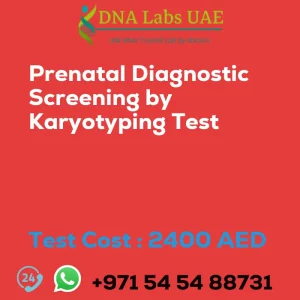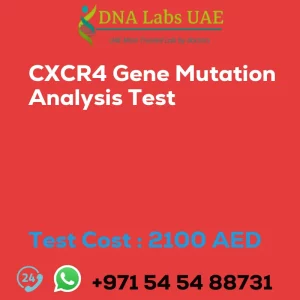ALL PCR Panel Cytogenetics and PCR BCRABLTELAML1MLL E2A Test
Test Name: ALL PCR Panel Cytogenetics and PCR BCRABLTELAML1MLL E2A Test
Components: EDTA Vacutainer (2ml)
Price: 2300.0 AED
Sample Condition: Bone marrow / Peripheral blood (Transport immediately)
Report Delivery: 5-6 days
Method: Real Time PCR
Test Type: Genetics
Doctor: General Physician
Test Department:
Pre Test Information: ALL PCR Panel (BCR/ABL,TEL/AML1,MLL, E2A] can be done with a Doctors prescription. Prescription is not applicable for surgery and pregnancy cases or people planning to travel abroad.
Test Details:
PCR panel cytogenetics is a technique used in molecular genetics to detect specific chromosomal abnormalities or genetic mutations. It involves the use of polymerase chain reaction (PCR) to amplify and detect specific DNA sequences associated with these abnormalities. The specific PCR panel cytogenetics mentioned includes the following:
- BCR/ABL: This PCR assay is used to detect the fusion of the BCR (breakpoint cluster region) gene on chromosome 22 and the ABL (Abelson) gene on chromosome 9. This fusion is commonly associated with chronic myeloid leukemia (CML) and a subset of acute lymphoblastic leukemia (ALL).
- TEL/AML1: This PCR assay is used to detect the fusion of the TEL (ETV6) gene on chromosome 12 and the AML1 (RUNX1) gene on chromosome 21. This fusion is primarily associated with pediatric B-cell precursor acute lymphoblastic leukemia (ALL).
- MLL: This PCR assay is used to detect rearrangements involving the MLL (mixed-lineage leukemia) gene on chromosome 11. MLL gene rearrangements are associated with various types of leukemia, including acute myeloid leukemia (AML) and acute lymphoblastic leukemia (ALL).
- E2A: This PCR assay is used to detect rearrangements involving the E2A (TCF3) gene on chromosome 19. E2A gene rearrangements are commonly observed in B-cell precursor acute lymphoblastic leukemia (ALL).
These PCR panel cytogenetics assays are valuable tools in the diagnosis and monitoring of various hematological malignancies, as they provide specific genetic information that can guide treatment decisions and prognosis assessment.
| Test Name | ALL PCR Panel Cytogenetics and PCR BCRABLTELAML1MLL E2A Test |
|---|---|
| Components | EDTA Vacutainer (2ml) |
| Price | 2300.0 AED |
| Sample Condition | Bone marrow \/ Peripheral blood (Transport immediately) |
| Report Delivery | 5-6 days |
| Method | Real Time PCR |
| Test type | Genetics |
| Doctor | General Physician |
| Test Department: | |
| Pre Test Information | ALL PCR Panel (BCR/ABL,TEL/AML1,MLL, E2A] can be done with a Doctors prescription. Prescription is not applicable for surgery and pregnancy cases or people planing to travel abroad. |
| Test Details |
PCR panel cytogenetics is a technique used in molecular genetics to detect specific chromosomal abnormalities or genetic mutations. It involves the use of polymerase chain reaction (PCR) to amplify and detect specific DNA sequences associated with these abnormalities. The specific PCR panel cytogenetics mentioned includes the following: 1. BCR/ABL: This PCR assay is used to detect the fusion of the BCR (breakpoint cluster region) gene on chromosome 22 and the ABL (Abelson) gene on chromosome 9. This fusion is commonly associated with chronic myeloid leukemia (CML) and a subset of acute lymphoblastic leukemia (ALL). 2. TEL/AML1: This PCR assay is used to detect the fusion of the TEL (ETV6) gene on chromosome 12 and the AML1 (RUNX1) gene on chromosome 21. This fusion is primarily associated with pediatric B-cell precursor acute lymphoblastic leukemia (ALL). 3. MLL: This PCR assay is used to detect rearrangements involving the MLL (mixed-lineage leukemia) gene on chromosome 11. MLL gene rearrangements are associated with various types of leukemia, including acute myeloid leukemia (AML) and acute lymphoblastic leukemia (ALL). 4. E2A: This PCR assay is used to detect rearrangements involving the E2A (TCF3) gene on chromosome 19. E2A gene rearrangements are commonly observed in B-cell precursor acute lymphoblastic leukemia (ALL). These PCR panel cytogenetics assays are valuable tools in the diagnosis and monitoring of various hematological malignancies, as they provide specific genetic information that can guide treatment decisions and prognosis assessment. |







